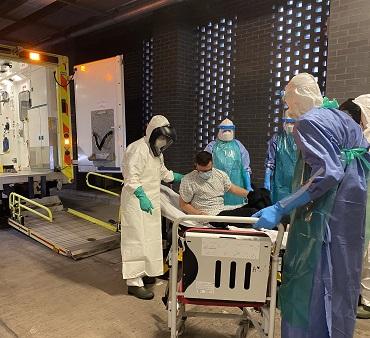
Southmead Hospital is now a designated Treatment Centre for adults with Airborne High Consequence Infectious Diseases.
It is one of only seven hospitals in the country – and the only one in the South West – for the care of adults with Airborne High Consequence Infectious Diseases (HCID), such as MERS and Avian Flu.
This means that if someone requires inpatient or critical care for one of these infections, they may be admitted to Southmead Hospital and treated in a dedicated isolation unit or space in the Intensive Care Unit.
HCIDs are rare in the UK so the number of patients likely to require treatment in the North Bristol NHS Trust (NBT) Treatment Centre at Southmead is low. These diseases require specific infection prevention and control measures to prevent their spread, such as isolation areas and the use of personal protective equipment (PPE), so caring for patients in dedicated centres helps with their management.
Having a centre in Bristol means that patients can be treated and followed up closer to their home, which will improve the patient experience.
The Infectious Disease department at Southmead has grown over recent years and this designation as a HCID Treatment Centre recognises the great work of the team.
To prepare for becoming a centre, processes were developed for the isolation of patients to ensure the safety of staff and other patients and these were tested at a recent exercise at the hospital.
Colleagues from South Western Ambulance Service NHS Foundation Trust and other partners supported with the transfer of a person taking on the role of a patient with a confirmed HCID to run through PPE processes and the movement of patients to the isolation unit during the exercise.
Ankur Gupta-Wright, one of the HCID Lead Consultants at Southmead Hospital, said: "Being able to provide this service in Bristol means we can look after patients with Airborne HCID's closer to home, and provides NBT and the region with more resilience for future epidemics or pandemics.”
Chief Nursing Officer, Professor Steve Hams, said: “We are proud to be recognised as one of just seven designated Airborne High Consequence Infectious Disease (HCID) centres in the country, a role that enables us to provide specialist care for patients with the most complex Airborne infectious diseases.
This achievement reflects the significant growth and development of our infectious diseases team at NBT in recent years, and highlights our emergence as a true centre of excellence for expert, compassionate care.”
Professor Dominic Mellon, Regional Deputy Director for Health Protection (South West) at the UK Health Security Agency (UKHSA) added: “The establishment of this new HCID unit at Southmead Hospital is an example of how we continue to prepare for and develop our response capabilities for emerging infectious diseases and pandemics.
“The UKHSA South West regional team continues to work with its partners to plan for outbreaks, incidents and emergencies, to train alongside our NHS colleagues, and to test our plans and procedures through exercises and simulations. The North Bristol NHS Trust team continue to demonstrate their strong commitment to working with their local and regional partners to protect the public’s health.”
Wayne Darch, Deputy Director of Operations at the South Western Ambulance Service NHS Foundation Trust, said: “In the event of a patient having an infectious disease, we have clear processes and plans in place to help protect and care for them, and the wider community.
“Being able to test and exercise our response plans allows us to increase our preparedness for any complex airborne infectious diseases. It also provides an excellent opportunity to work alongside other emergency services and partner organisations.”
